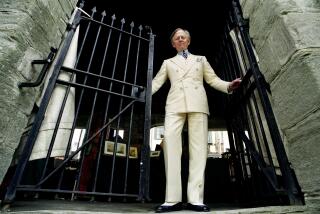Go ahead and open his ‘Mail’
- Share via
RIGHT from the get-go, it’s clear that “Junk Mail,” British novelist Will Self’s grab bag of nonfiction pieces, will not induce boredom pangs. You want a grabber? Try this opening on for size, from the book’s first piece: “A journalist friend of mine asks me to take her out on the street and show her some crack dealing in action.”
Consider this a stern warning if you are expecting to read genteel musings on the great 19th century French social realists or some such thing. Self, who has acquired a well-earned rep as one of England’s least reverent and most inventive writers, seems to care not a whit if he’s working under the banner of respectable British papers such as the Observer and the Independent. He’s still going to write whatever he wants, as evidenced by the 31 articles collected here (some of which have appeared in two British collections, “Feeding Frenzy,” and another, also called “Junk Mail”).
“New Crack City” is a tautly written journey among London’s crack dens and the flat of his dealer bud, where Self happens upon a young man “incongruously dressed in a velvet-collared crombie ... buying a rock and a bag of brown.”
When Self is commissioned to write catalog copy for the notorious British painter and ex-junkie Sebastian Horsley, he comes up with a rather lovely and strange story called “Scab” about a self-mutilator (Horsley? The author?) being treated in a hospital for his “ovoid ... open weeping sores,” which he likens to the “squashed semaphore of modern campaign ribbons, wound round my thighs, tightened up into tourniquets.”
What does it mean? Who knows, but it’s pure pleasure. “Junk Mail” is the rare file-clearing collection that you’ll want to read front to back without skipping anything, so nourishing is Self’s exuberant and savagely intelligent prose.
At the risk of sounding like an obnoxious anglophile, this is exactly the kind of high-risk, high-reward reportage that we don’t see enough of in mainstream American print publications. The writer plunks himself into these stories, New Journalism-style, without coming off like some solipsistic jerk; he never sacrifices the story for his own self-regard. That’s a tricky balancing act and it yields great work.
The book’s travelogues are worth savoring for their numerous digressions. A trip to a Sufi festival in Konya, Turkey, to see the whirling dervishes becomes an excuse to rant about the hollow ring of “spiritual tourism” in which “trivial pleasures” are extracted “from the profundities of other cultures.”
“When Westerners are young we tend to do this in a material dimension, taking our cheap holidays in other peoples’ misery. But when we grow old enough and rich enough we might think we’re behaving more laudably by taking expensive ones in other’s peoples’ piety.” Despite his jaundiced view, Self does find a measure of enlightenment in the clash of cultures in Turkey; that’s what raises the piece above the common rubble of rant into something special.
Self takes this crude tromping upon native culture seriously because for him geography is destiny. In “Self’s London,” he eloquently examines the inextricable link between himself and his home city: The city, he writes, “is filled in with narratives, which have been extruded like psychic mastic into its fissures. To traverse central London today ... is still to run over a hundred memoirs.” It’s hard indeed to get to the heart of a place. In war-torn Northern Ireland, he observes in “A Little Cottage Industry” that “a real incident is rendered progressively more unreal by overlay upon overlay of narrative obfuscation.”
As you near the book’s end, an ostensibly disparate collection (there are also pieces about Bret Easton Ellis, Woody Allen and Martin Amis, among others) is rendered cohesive by a running theme: the disconnect between myth and reality, persona and personality. Self’s profiles of singers Morrissey and Marianne Faithfull are two of the best things ever written about these endlessly scrutinized artists. Trying to dig beneath the hard carapace of celebrity is tricky, but Self does it: “[Faithfull’s] face bears the self-inflicted scars of a woman who’s been driven to slice away at the looks which have masked her soul.”
That’s hardly the stuff of junk mail. It’s more like first-class.
*
Marc Weingarten is the author of “The Gang That Wouldn’t Write Straight: Wolfe, Thompson, Didion and the New Journalism Revolution.”
More to Read
Sign up for our Book Club newsletter
Get the latest news, events and more from the Los Angeles Times Book Club, and help us get L.A. reading and talking.
You may occasionally receive promotional content from the Los Angeles Times.










